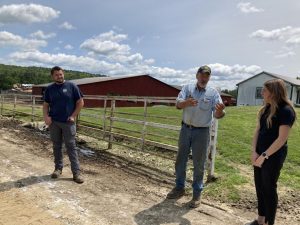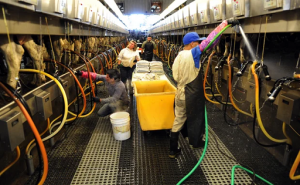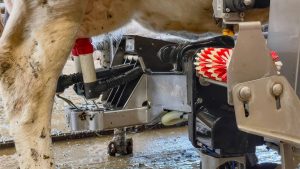
Last week’s announcement of the Northeast Organic Family Farm Partnership is a novel idea. But it’s going to take more than written commitments to fundamentally change the landscape of dairy in the region, especially organic dairy.
Announced by Stonyfield Organic founder Gary Hirshberg, the partnership has been described as a “first-of-its-kind” collaboration of farmers, processors, activists, government agencies and consumers to save at-risk farms. It encourages consumers to buy at least one-fourth of their weekly dairy purchases from a list of 35 “brand partners” — ranging from Organic Valley and Stonyfield to much smaller dairy farms that sell organic products, and get at least 50% of their milk from area organic dairy farms or pledge to buy more from area farms.
Retailers can become partners by pledging to increase their 2022 organic dairy purchases over last year and display an official Northeast Organic Family Farm Partnership logo in the store and online.
I talked to Ed Maltby, executive director of the Northeast Organic Dairy Producers Alliance and member of the partnership’s board of directors, earlier this week. He said, “We do need to control the pooling of milk in the Northeast, as there is an immense market for buying local and supporting farming.”
But there is a big problem: lack of processing. Building a new dairy plant is expensive, and there must be enough of a market for local organic dairy milk for that to happen. There also must be enough farms to milk the cows, and unfortunately, the midsize dairy farm in the Northeast has all but disappeared. Farms are either very large — and likely conventional — or very small and are not big enough to supply the entire market. The ones in the middle survive because they have found a niche or do some sort of direct marketing of their own products.
This partnership may be too little, too late to save the 135 organic dairy farms that are set to lose their marketing contracts by next year.
Searching for a market
Danone, the parent company of Horizon Organic, is giving the 89 producers it dropped a six-month reprieve until 2023 to find new milk markets. Horizon Organic originally announced that it was pulling out of the Northeast by August.
Maple Hill Creamery, based in Kinderhook, N.Y., announced that it was canceling contracts with 46 of its organic dairy farms.
Maltby says that many of the farmers are attempting to become members of Organic Valley’s CROPP Cooperative, but he does not know how many the cooperative can bring on.
“They [Organic Valley officials] have not given any indication on how many they could take. Field reps are out talking to farmers seeing if they fit into their existing routes. It’s a delicate balance,” he says, as the cooperative is already operating on a quota system with its existing farms, leaving little wiggle room to take on many more.
Organic Valley also provides 80% of the milk used by Stonyfield Organic in New Hampshire. Maltby says there is a possibility Stonyfield could take on additional farms, but the company’s plant in Londonderry, N.H., is small, he says, and there may not be enough capacity to take on more.
Around 10 of the farms — half of them in northern New York — are getting out of dairying altogether. The rest, he says, are under a lot of stress knowing that as each day goes by, their time having a buyer is closer to coming to an end.
No longer gold
Having an organic certification was once considered the golden ticket for dairy farmers. It promised better prices and more loyal consumers who were willing to shell out a few more bucks to say they were drinking something that came from an organic farm.
In the end, consolidation of the dairy industry reared its ugly head in organic circles, too. Processors have found that getting milk from a few larger farms farther west and shipping it back is more economical than having to drive routes in remote areas where only a handful of small farms exist.
I hope this partnership works and creates a market that supports thriving local farmers and infrastructure. A commitment from lawmakers to not make farming so overregulated and costly would also relieve the burden of high costs.
If consumers step up to the plate and show there is enough of a market for a local organic dairy processor, there should be no reason that state lawmakers couldn’t put their heads together to pitch in a few bucks to build a new plant to ensure milk that’s produced here stays here.
Maybe then I’ll have a happier story to write, for once.























